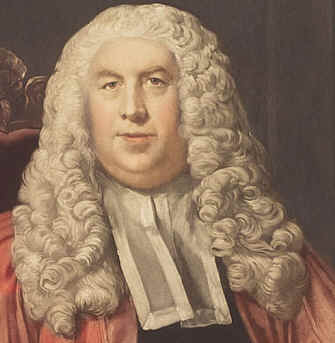 made attorney general. His
rival for that office was Sir Francis Bacon, thereafter one of Coke's
bitterest enemies. He earned a reputation as a severe prosecutor, notably at
the trial of Sir Walter Raleigh, and held a favorable position at the court
of King James I. In 1606 he became chief justice of the common pleas. In
this position, and (after 1613) as chief justice of the king's bench, Coke
became the champion of common law against the encroachments of the royal
prerogative and declared null and void royal proclamations that were
contrary to law. Although his historical arguments were frequently based on
false interpretations of early documents, as in the case of the Magna Carta,
his reasoning was brilliant and his conclusions impressive. His constant
collisions with the king and the numerous enmities he developed—especially
that with Thomas Egerton, Baron Ellesmere, the chancellor—brought about his
fall. Bacon was one of the foremost figures in engineering his dismissal in
1616. By personal and political influence, Coke got himself back on the
privy council and was elected (1620) to Parliament, where he became a leader
of the popular faction in opposition to James I and Charles I. He was
prominent in the drafting of the Petition of Right (1628). His most
important writings are the Reports, a series of detailed commentaries
on cases in common law, and the Institutes, which includes his
commentary on Littleton's Tenures.
made attorney general. His
rival for that office was Sir Francis Bacon, thereafter one of Coke's
bitterest enemies. He earned a reputation as a severe prosecutor, notably at
the trial of Sir Walter Raleigh, and held a favorable position at the court
of King James I. In 1606 he became chief justice of the common pleas. In
this position, and (after 1613) as chief justice of the king's bench, Coke
became the champion of common law against the encroachments of the royal
prerogative and declared null and void royal proclamations that were
contrary to law. Although his historical arguments were frequently based on
false interpretations of early documents, as in the case of the Magna Carta,
his reasoning was brilliant and his conclusions impressive. His constant
collisions with the king and the numerous enmities he developed—especially
that with Thomas Egerton, Baron Ellesmere, the chancellor—brought about his
fall. Bacon was one of the foremost figures in engineering his dismissal in
1616. By personal and political influence, Coke got himself back on the
privy council and was elected (1620) to Parliament, where he became a leader
of the popular faction in opposition to James I and Charles I. He was
prominent in the drafting of the Petition of Right (1628). His most
important writings are the Reports, a series of detailed commentaries
on cases in common law, and the Institutes, which includes his
commentary on Littleton's Tenures. underlying
law used in England and the United States.
underlying
law used in England and the United States.
Blackstone wrote prolifically on the laws on the England. His Commentaries were well received, went through a number of editions, and are still cited in modern legal references such as Black's Law Dictionary.
Here is an overview of some editions:
|
Commentaries on the Laws of England, 1st ed Commentaries on the Laws of England,
3rd ed Commentaries on the Laws of England: in Four Books, 4th ed (Oxford: Clarendon Press, 1770) |
When cited, the book is so authoritative that references written for lawyers can be abbreviated with the volume, title abbreviation, and page: example, 1 Bl Comm 302. For lay readers, of course, it is helpful to be longer.